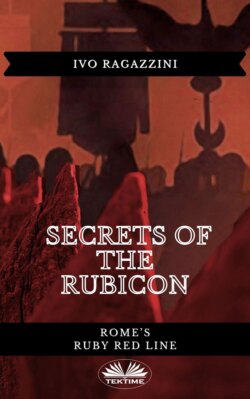Читать книгу Secrets Of The Rubicon - Ivo Ragazzini - Страница 10
The Urgon witch
ОглавлениеThere is the source of a river on the Romagna Apennines, which is still called Urgon today.
Many believe that the Rubicon originates there, since in the Romagna dialect that word could mean Rubicon, but to tell the truth this is not certain since, in the Romagna dialect, it should be Rubgon or at least Urbgon as well, if you use the Romagna pronunciation as it is fairly closed.
Instead, no one has ever noticed that the word Urgon in ancient Etruscan meant Gorgon, which is a kind of horrible and terrifying witch similar to the legendary Medusa and that where the Urgon rose, there was a place that today is still called Strigara.42
Also, a little way after these springs, there is another place that many still consider mysterious, named Gorgoscuro.43
But let's return to Curio as he begins to explain the witch of Urgon to everyone.
"This witch lives and casts spells in the mountains near the headwaters of the river."
"She is also said to have access to the underworld, to be able to see the past, present and future, and to resurrect the bodies of the dead, forcing souls to re-enter to create spells and magical hexes."
"And so? Even if it were true, she is not a Goddess, but only an intermedium44 between people, the underworld and the Gods. What could she possibly do against us?" replied the commander Mark Anthony.
"Even the Flamini priests are not divinities but only intermediaries between people and the Gods of Rome," answered Curio.
"That's not true, this is blasphemy. The Flamini and our other Roman priests speak with the mouths of the Gods of Rome and are their vicars on earth," replied General Labienus.
"For this reason, it is said that even the Witches speak with the mouth of the underworld and the afterlife," Curio replied.
"Yes, but they are inferior to the Flamini. Flaminis super stitiius striges, sed sub stantias Deis,"45 replied Labienus who fervently observed the Roman religion of the time.
"That's not the point. They are trying to influence us so we won't fight. We've seen many similar things used against us during the Gaul campaigns and the Roman legionaries have little fear of barbarian deities, but the Gallic might be held back and frightened by these things. Tell us, Curio, what else do you know about this Gorgon witch," interrupted Caesar to stop the discussion.
"Just before the springs, there is an embankment where an artificial lake has formed, used to regulate the flow of the waters from the Prissatellum River, which separates us from Pompey's legions."
"Informants have also told me they intend to use the Gorgon to curse that water and release it into the river as soon as they see we are preparing to attack them."
"Of course they'll spread the story that anyone who crosses that water will soon die so as to try to stop us from crossing the river."
"Then they will fill the banks of the prissatellum with Gorgon heads and masks tied to poles set into the ground as a limit and border to bring bad luck to those who cross. In this way our legionaries will be affected and filled with fear of crossing that river,"46 Curio ended his explanation.
"I'm a little superstitious myself, but if that's the only problem, let's leave all the countermeasures and protections to a couple of Druids in our Gallic legions. Some of them are very good," replied a Gaul commander who was also present.
"What could a Druid do to protect our troops?" asked Caesar quickly.
"Druids don't talk too much about what they can do, but they can free us from spells and curses, woods and places in the forests, leaving you fairies and goblins to guard in their place, they can heal all evil and witches' curses with herbs, cause springs and rivers to become miraculous and magical, they can cast abominations and curses on their enemies that are so powerful that they can paralyze anyone."
"But they refuse to curse the gods of the enemies directly, only to defeat them in battle. Druids curse places and people but not Gods," replied the commander of the Gauls with conviction, by way of explanation.
"How can you be so certain about all this?" asked Hortensius.
"A Druid accompanied me at night under an oak tree in a northern forest and showed me and others many things, also what I've just told you."
"And couldn't it have been a trick or an illusion of the mind?"
"I don't think so, but even if it were, Gallic soldiers believe the Druids. And that makes the difference," replied the commander of the Gauls.
"Well, then the Druids could be used to secure the banks and woods on the border against the witch and to protect the Gauls from curses on whoever crosses the border," explained the commander Hortensius.
"I agree with you Hortensius," Caesar intervened.
"Pompey, does not have enough strength, and is trying to stop us by instilling fear. In the morning try and find out what they intend to do on the river and arrange for the Druids to be ready to protect those places and our men," Caesar ordered.
"Caesar it shall be done," replied Hortensius.
"Now, enough about Gods and witches. Let's move on to the military strength in the field. Show me our lines and those of Pompey again," said Caesar, to try to resist, without letting him see, the slight fear he felt about crossing the Rubicon.
